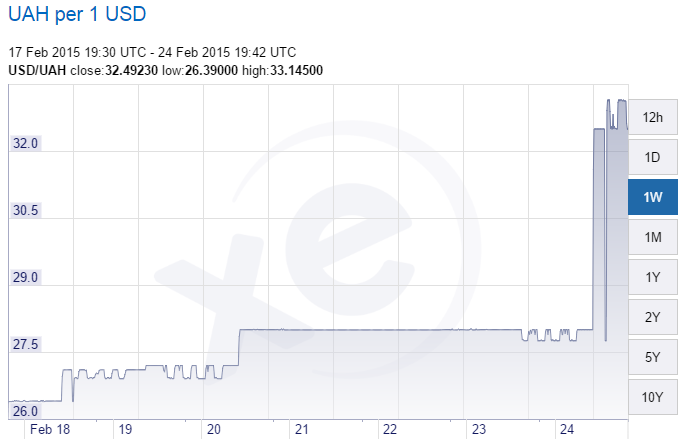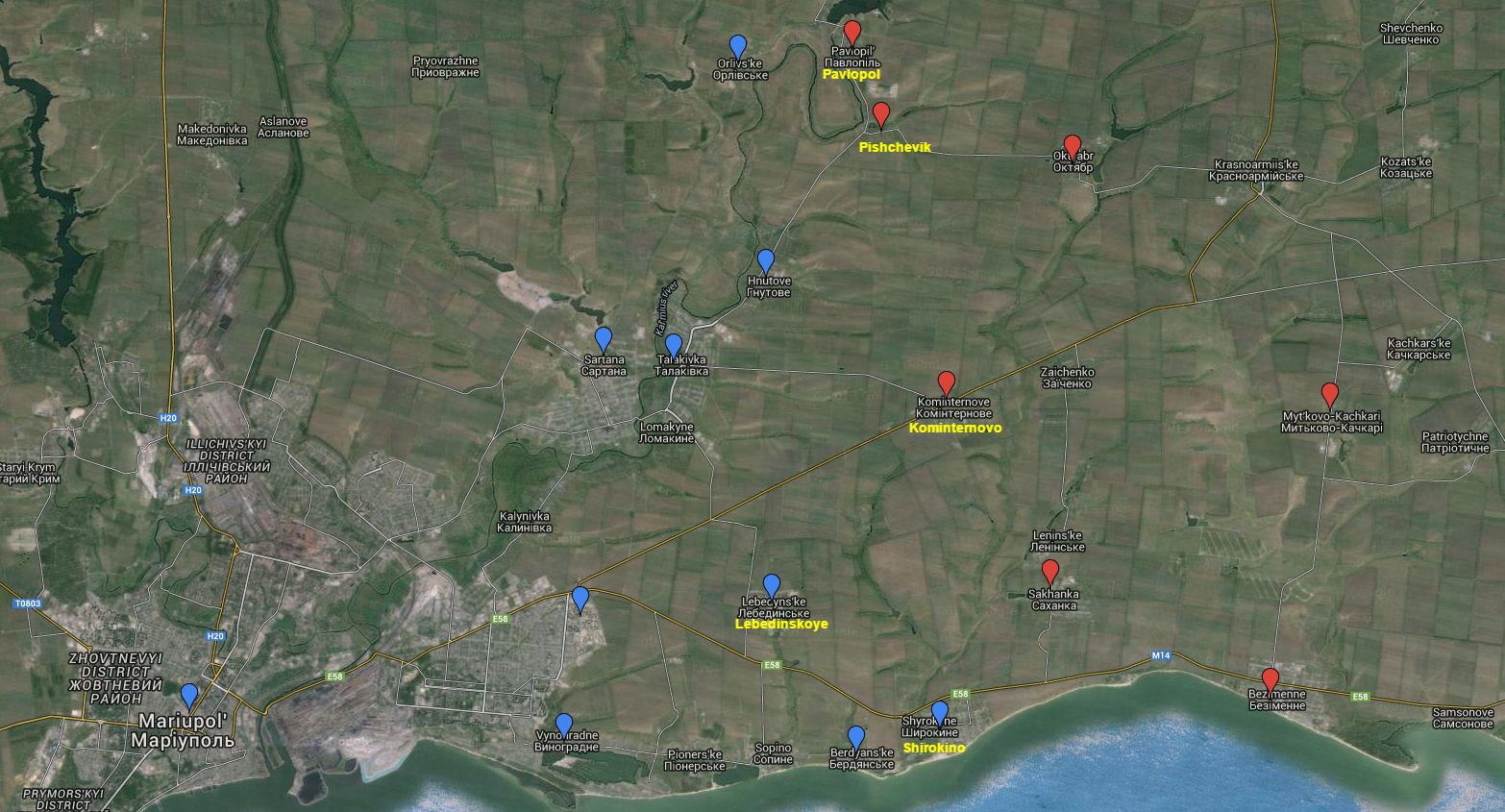Yesterday’s live coverage of the Ukraine conflict can be found here. An archive of our liveblogs can be found here. For an overview and analysis of this developing story see our latest podcast.
Please help The Interpreter to continue providing this valuable information service by making a donation towards our costs.
For links to individual updates click on the timestamps.
For the latest summary of evidence surrounding the shooting down of flight MH17 see our separate article: Evidence Review: Who Shot Down MH17?
Yesterday we reported that the hryvnia fell nearly 10%, hitting record lows and triggering emergency action from Ukraine’s Central Bank. Today it has fallen another 16%, according to Bloomberg and Xe, closing at 32.50 hryvnia to a single U.S. dollar:

— James Miller
The British prime minister, David Cameron, has told the Commons liaison committee that the UK will send military personnel to Ukraine next month to provide training assistance for the Ukrainian army.
“Over the course of the next month we’re going to be deploying British service personnel to provide advice and a range of training, to tactical intelligence to logistics, to medical care,” Cameron told a committee of lawmakers in parliament.
“We’ll also be developing an infantry training program with Ukraine to improve the durability of their forces.”
Up to 75 personnel will begin to deploy to Ukraine from next month as part of the training mission, the Ministry of Defence said.
There will be four separate areas covered by the deployment – medical, intelligence, logistics and infantry training.
Personnel involved in the training elements could spend one or two months in Ukraine, with a command and control deployment lasting up to six months.
The Guardian reports that, when asked whether the UK is considering supplying Ukraine with “lethal defensive equipment,” Cameron responded that “Britain is not at that stage.”
Cameron did say that he would not rule out supplying lethal weapons forever though, adding that the US was also considering the idea.
These comments echo ones made earlier by the former foreign secretary, William Hague, who told the BBC’s Andrew Marr show:
“We are not planning as the UK to send arms to Ukraine. It hasn’t been our approach in any recent conflict in recent years to send arms into those conflicts.”
Cameron did, however, insist that the best leverage that could be brought to bear in the Ukrainian conflict was economic rather than military.
The Guardian reports on one exchange at the committee:
[Bernard Jenkins, chair of the public administration committee asked]: People say there is no military solution to this. But there is. When there was a conflict in Georgia, it came to an abrupt end when America despatched its fleet.
Cameron says the biggest effect that could be had would be an economic effect.
The greatest power we have in this crisis is an economic one, he says. That is the one we should be leveraging.
Earlier this month, British, ex-service Saxon armoured cars were delivered to Ukraine. The lightly armoured vehicles were bereft of armament, though they could be fitted with machine guns.
The prime minister also said that suspending Russia from membership of the SWIFT banking system, a measure discussed previously in the EU, should not be ruled out.
— Pierre Vaux
Yesterday, Ukraine’s gas company, Naftohaz, said that the Russian energy giant Gazprom had not delivered the entire quantity of natural gas which Ukraine had prepaid for. We also noted that the announcement came just days after Ukraine halted gas supplies to parts of the Donbass occupied by Russian-supported fighters, forcing Russia to begin delivering its own gas shipments to separatist territories.
Today Gazprom is saying that Ukraine has not paid for its gas, and Russia could shut off gas flows to Ukraine within two days. AFP reports:
Russia’s state-owned gas giant Gazprom warned Tuesday it could cut off gas deliveries to Ukraine within two days, upping the stakes in the crisis there — and threatening supplies to the rest of Europe…
“Ukraine has failed to make a new pre-payment for gas in time,” Gazprom CEO Alexei Miller said in a statement on Tuesday.
That “will in two days lead to a complete termination of the Russian gas supplies to Ukraine, which creates serious risks for the gas transit to Europe,” Miller said.
He added that it takes two days for Gazprom to receive money transferred from Naftogaz.
But the Ukrainian company issued a statement accusing Gazprom of failing to honour pre-paid gas deliveries on Sunday.
— James Miller
Nadezhda Savchenko, a Ukrainian military officer who was captured by separatist fighters and illegally transported to Russia, where she is now on trial on murder charges, has called on her supporters to join the planned March 1 ‘anti-crisis’ protest in Moscow.
Savchenko has been on hunger strike since December 13, in protest at the Russian authorities’ refusal to acknowledge her status as a prisoner of war and to suspend her trial, in accordance with the Geneva convention. Since February 20, she has refused glucose injections.
One of Savchenko’s lawyers, Mark Feygin, posted a photo of her letter:
Translation: Nadezhda’s call to the protest on March 1. Translate into Russian too.
Twitter user @OldArtillery translated the letter into Russian:
The Interpreter translates:
I can’t express how grateful I am to you for everything…
For all the support and the desperate fight you are carrying on for me.
Even in my boldest dreams, I could not have reckoned upon such support.
I am fighting too! And I’m not giving up! And will not be broken!
Because I am not only fighting for myself, but against a system, which cripples and kills only those who are afraid of it and folds before those who do not fear it.
I am not afraid! We have many Ukrainians in Russian jails.
We need to get the first one out, so then it will be easier to fight for everyone!
Ukrainians have already shown the world an example of a revolution of dignity and how to fight against a hostile, self-satisfied government. And now I and all of Ukraine have to fight yet again against the crooked government of our neighbour.
Wish me and Ukraine success in this unequal battle with your support in the global protest on March 1, 2015.
I thank you with all my heart.
Feygin reported that Savchenko’s health was deteriorating and reiterated that there was little time left to release her before she could die. Savchenko has now been on hunger strike for 74 days.
On February 10, the Basmanny court in Moscow extended Savchenko’s pre-trial detention until May 13.
Translation: Nadezhda’s health is definitely deteriorating. So we don’t have much time for her release. And she is refusing to stop her hunger strike.
— Pierre Vaux
The French Foreign Ministry is hosting talks today between the foreign ministers of Ukraine, Russia, Germany and France, but it’s not clear what these four-way talks will accomplish.
The Russian government-operated propaganda outlet Sputnik is carrying statements from Russian foreign minister Sergei Lavrov who says that the three hour talks have been “fruitful“:
“It was a useful meeting,” Lavrov told reporters in a brief comment without further elaboration…
According to the Russian Foreign minister the situation in Donbas has improved significantly, a point that Russia’s Western partners have also acknowledged.
“The situation has improved significantly, this was acknowledged by my partners,” Russia’s top diplomat said following the Paris meeting.
Meanwhile, Ukrainska Pravda reports, citing the BBC Ukrainian Service, that the Ukrainian foreign minister, Pavlo Klimkin, has said that the Normandy quartet of foreign ministers were unable to reach an agreement on the Russian-backed seizure of Debaltsevo.
“Unfortunately, there was no political decision with regards to what happened in Debaltsevo.”
Klimkin did however add that:
“We were able to agree on a range of technical aspects, including the important issues of how to support the OSCE mission, increasing the capabilities of this mission and, of course, maintaining the ceasefire and the withdrawal of troops.”
But fundamental differences remain about whether various aspects of the Minsk deal are being met. Ukraine says that their positions continue to be attacked by Russian-supported forces, while the separatists deny those claims. Ukraine says that as a result it cannot withdraw its heavy artillery, whereas today the separatists claim that they are withdrawing heavy weaponry from the area around Debaltsevo and Donetsk. The Ukrainian government, however, remains doubtful. Reuters reports:
“Today at 9 in the morning (1 a.m. ET) the planned withdrawal of heavy equipment started,” rebel commander Eduard Basurin told Reuters. “We’re pulling it back 50 km (30 miles) from the boundary line … Of course we won’t say exactly where we’re pulling it back to.”
Basurin denied Ukrainian military reports of fighting in southeast Ukraine, saying there had been “provocations” from the government side but no serious clashes.
But the Kiev military said in a statement that rebel assertions they were pulling back guns were “mere empty words”.
“On the contrary, the terrorist groups, making use of the ceasefire period, are reinforcing their units and building up ammunition.”
We will continue to monitor troop movements to see whether we can confirm reports that the Russian-backed forces have started to withdraw, but as we have reported below they appear to be still on the offensive near Mariupol, south of Donetsk.
As far as improving the OSCE’s capabilities, we’ve heard that before, but at this moment the OSCE does not appear to be equipped to monitor this ceasefire.
Journalist Linda Kintsler has just visited Kharkiv and has spoken with NPR this morning. She says the situation is tense and the citizens fear that more terrorist attacks will occur. Her radio interview can be heard here.
— James Miller
Russia’s state-owned RIA Novosti news agency reports that fighters for the self-proclaimed ‘Donetsk People’s Republic’ (DNR) have “liberated” two villages east of Mariupol.
The villages of Pavlopol and Pishchevik, over which Ukrainian forces had lost control following the Russian invasion of Novoazovsk at the end of last summer, were retaken by Ukrainian troops in an offensive launched on February 10.

Ukrainian Azov regiment fighters outside the Pavlopol village council on February 10.
The claim of the re-capture of these villages by Russian-backed forces was not denied by Dmitry Chaly, the spokesman for the Ukrainian military headquarters in Mariupol.
Chaly told Ukrainska Pravda that he “could not confirm or deny these reports” because the villages lie in the nominal buffer zone between the Ukrainian and separatist front lines.
The Interpreter translates:
“These sites are located in the buffer zone, they are not under our control and we don’t have units there. The militants could simply walk in.”
When Ukrainska Pravda asked Chaly how this tallied with the Ukrainian announcements of the retaking of villages, including Pavlopol, on February 10, the spokesman replied:
“Yes, a clean-up was carried out then, but our units then left, because this is neutral territory.”
It seems here that Chaly is attempting to nullify enemy gains by claiming there has been no defeat in battle.
For Russian-backed fighters to have retaken these villages while Ukrainian troops are struggling to hold out against a counter-attack in nearby Shirokino, another village retaken on February 10, is surely bad news for the Ukrainian military.
Furthermore, a Facebook post from the Mariupol headquarters, made yesterday at 12:34 GMT, suggested that Kominternovo, another village retaken on February 10, was once again occupied by Russian-backed forces.
According to the announcement, the Ukrainian-held village of Lebedinskoye had been shelled that day with heavy artillery, fired from Kominternovo.

It appears then that, bar their tenuous foothold in Shirokino, all of Ukraine’s gains made since February 10 have been reversed.
— Pierre Vaux